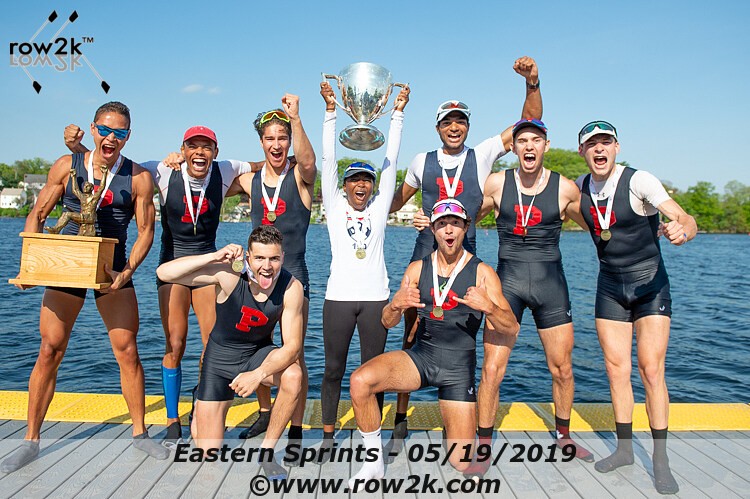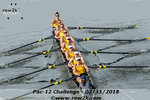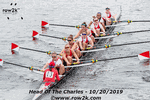Program Building Part 3 - Maintaining Success

Following the cancellation of the 2020 spring racing season, row2k solicited the collegiate coaching community to engage in a variety of high-level topics within the profession. We submitted over sixty questions across a dozen topics and thank the coaches and staffs that found time to contribute their thoughts during this stressful time.
This week we focus on the topic of Program Building with the following question:
WHAT ARE THE MOST IMPORTANT FACTORS IN MAINTAINING SUCCESS OVER MULTIPLE YEARS?
COLIN FARRELL – PENN LIGHTWEIGHT MEN
There’s a lot that goes into this question. Primarily though, it would start with attracting the right athletes to your team and then retaining them for four years. That’s really paramount because you need the people to make it all go and development in sports takes time. So, that’s really the bottom line of all of this, but once you get the people in place, then I think it’s really three things with a fourth added.
1) Understanding what the standards are for success – what is the quality and intensity required at practice, what kind of speed does it take to win, what kind of ergs does it take, what do we need to do in the weight room, etc… all the metrics you need to hit.
2) Understanding what steps are needed to hit those standards and make progress towards them – If step 1 is about goals, then step 2 here is about the process to achieve those goals.
3) Doing the work. This is where the rubber meets the road and teams tend to fail or succeed, but I find that if you know #1 and you know #2, then #3 becomes a lot simpler. You can start to make those connections between what you’re doing on a daily basis and what the overall outcome of the team will be. This goes back to culture and decision making.
The 4th thing I would add is - Working to figure out how this team wants to work together to achieve those goals. Rowing is a team sport and every team is different. That makes every year really fun and unique. We really work at Penn to have the team take ownership for the process because I don’t believe there is only one path to the top. We know where we want to get to and we know certain things that need to happen along the way, but the specific path the group wants to take is really up to them. It’s about the team figuring out how to maximize itself and get everyone involved to create positive momentum and fun!
ETHAN SHOEMAKER – STETSON
The only thing that doesn’t change on a team is the fact that things will change. A mentor of mine once told me to expect to have a new team every two years. So, when I am building for long-term success, I have three rules.
1) Your first-year rowers are your team’s future. Spend a lot of time developing them and make sure to never rush their progress.
2) Never overlook any young rowers. I can think of several athletes that I thought would never make it and then turned out to be an important member of the team a year or two later. Sometimes an athlete just needs a little more time, never give up on them.
3) Remember winning doesn’t beget winning. Winning begets complacency. If you want long-term success as a team, focus on the process and keep the goals just beyond the current reality. An ambitious team will keep working, even after they win a race here or there.
COLIN TRUEX – UC SAN DIEGO WOMEN
If you are successful in establishing norms and expectations in those first couple of years you can really hit your stride as a coach. The goal is that the upperclassmen, who now have been with you a couple of years, can help reinforce and teach the team culture to the new team members as they come. This can also help guide your recruiting process because I believe we all are looking for the ‘right’ athletes, not just the best ones.

Success has a funny way of creating more success because it builds trust amongst the coaches and athletes, confidence that what is happening is working, and honestly- it attracts talent. It is important to keep learning and bringing new ideas to the table in this time as well, because a little success can also lead to complacency and perhaps a cut/paste approach from year to year. While a strong culture is bigger than an individual team, each team, each group of athletes will be a little different so be adaptable with each season.
YAZ FAROOQ – WASHINGTON WOMEN
There are two parts to it: Making sure we attain certain benchmarks that will put us at a competitive level physically, technically and mentally--and working closely with the student-athletes to keep the process fun as we work towards those goals. We keep certain routines because they are a part of the rhythm of how the team runs and are gauges to help the rowers know how they’re doing and improving, but the ways we’ve gone about it every year so far have honestly been very different. I can say that each year has been a really cool chapter for me personally at Washington and I enjoy the fact that each one has had its own unique challenges and adventures!
JAMIE FRANCIS – EMBRY RIDDLE
Although our team is new, I think we’ve had success over multiple years because I think you have to define your own success. Yes, winning a national championship is one measure of success and we haven’t done that yet, but we have been successful every year because we have continued to improve ourselves and our results against other teams and against ourselves.
SANDRA CHU – WILLIAM SMITH
Consistency of behaviors and the relentless pursuit of excellence are the key factors to prolonged success. The coaches must provide consistent messaging, work ethic, and guidance. The athletes must respond with consistent quality of work, behaviors and peer leadership. If your core values are strong and align with your definition of success, then making mission-driven decisions will result in a consistent culture with consistent results.
LEE RUMPF – GEORGETOWN LIGHTWEIGHT MEN
Maintaining success is accomplished by not setting out to maintain success. “What got you here won’t get you there” - Nich Lee Parker, ha.
This means two things. The first is the knowledge that every year you’ll need to work just as hard or harder than the year before. There are no shortcuts. Nobody will get slower for you. Your speed will not miraculously transfer from June to September. The second is that you need to constantly innovate, push the boundaries, seek advice and knowledge to keep pressing forward. To stagnate is to lose.
BRIAN PERKINS – TEMPLE MEN
“Success” needs to be defined and couched in realistic terms. In our rowing season, only one crew will win the IRA or Henley. I hear many coaches aim for improvement as success, and I think this is very healthy. Improvement in the classroom and on the water every year can build into something special.

ANONYMOUS HEAD COACH
Who we chose to let into the team has a profound effect on what that team becomes and how it performs. Think about this example: you just finish a great practice. You are stoked at the numbers you threw down that day. You share your news with two friends. The first friend says, “that’s incredible! You’re doing great. I wonder if I can do that next time?” The second friend says, “yeah, it’s okay. But we just have another workout tomorrow. It’s not like you’re doing anything special.”
It doesn’t take much to figure out which friend is better for the success of the team. We are interdependent as human beings on a team. What we are doing, or not doing, has an impact upon others. Our behavior triggers thoughts and responses in someone else. Success over multiple years can be sustained by actions that build up, consistently and methodically, the performance of the team.
ALICEA STRODEL – MINNESOTA WOMEN
Build relationships, clearly define our team values and express my expectations.
CAMPBELL WOODS – MARIST MEN
Define what you want your culture to be. This should be an open conversation with the team’s leaders. How do you improve that culture and strengthen it? Make sure you do small things each day to build on the culture you are looking for. Talk about mental things like how hard it hurts to do a test piece and how to get through the pain. Talk about success in the classroom and how it relates to personal success as an athlete and for the team. Reinforce this with your actions.
The coach’s job is like a white blood cell which is to identify weaknesses or diseases and help sweep them away while the athletes are like the red blood cells bringing new oxygen and nutrients to the table. The two components need to work together and communicate clearly.
The danger at a smaller program, is that the challenge of breaking into the IRA level is daunting and it can be easier to focus on smaller more beatable programs and satisfy yourself that you are faster than other similar teams. Part of my job as the coach is to harden our athletes to this mindset, which is absolutely poisonous to the urgency and desire to progress, that are needed to produce consistent growth.
Taking the time to verbally address what you are looking for in your athletes athletically, socially, and in the classroom is powerful and produces clarity. Make sure that the team leaders (all the upperclassmen) share this understanding and a desire to strengthen it among the younger members of the crew. Enhance the team’s culture by publicly applauding members who are demonstrating key attributes (especially the developing talent in the lower boats). Strengthen it by making sure that your own selection process takes this culture into account and reinforces the attitudes that you want in your top boats.
EMILIE GROSS – NORTH CAROLINA WOMEN
I feel like growth and adaptation, as mentioned before is a way to stay current and engaged with student-athletes as they are different year to year and generation to generation.
BART THOMPSON – ADRIAN
I think you have to constantly look for new goals and find ways that you can improve yourself. No one in our sport has ever been perfect; all of us have the ability to keep improving. So even when you win you say, “Alright, that was great. Now, how can we do even better?”
ERIC GEHRKE – GEORGE WASHINGTON MEN
I believe maintaining success over time falls back on being ‘process’ oriented. As long as the process is the focus over ‘winning’ then the team will continue pushing further and further on a daily basis making practices the hardest ‘races’ of the week. Also, creating an atmosphere where the athletes are happy. I genuinely believe happy athletes are the fastest ones. That doesn’t mean sunshine and rainbows every day but that they are being respected as young adults not children, greeted with smiles, and being given the moments to not focus on work and focus on being together while working.

TODD KENNETT – CORNELL HEAVYWEIGHT MEN
I have been fortunate enough to be part of some very successful teams, and part of some not so successful teams. I was part of a team that for 5 years really competed for 1st every race. The personnel changed significantly over that period of time, but the attitude remained. They worked really hard, those that did not work hard were not tolerated, and those that did work hard, had a lot of respect and fun together, working to go fast. It simply became who they were. Those that did not graduate were able to pass that work ethic and standard on to the next group. I would like to say I was part of it, but really it comes from the athletes. I can help, but athletes are the key to living and enforcing the standard.
ANONYMOUS HEAD COACH
Having a vision and sticking to it. Knowing what you want your team to look like and how you want it to function. Then following through on that. We’ve all heard the saying “you’re either coaching it, or allowing it to happen”, but that never rings truer than when you become a head coach. Consistency, communication, and recruiting the right kids that fit your vision.
MARLEE BLUE – WASHINGTON WOMEN
Understanding that every year is different. Respecting each person’s own personal journey. An essential part of our team culture that we do try and maintain every year is being internally focused. We only send love to other programs and gratitude for the whole NCAA that we are able to race against such amazing athletes. By staying internally focused, every year becomes an effort focused on the essential goal to “make the boat faster”. Some years that's going to be enough to win and other years it might not, but by attempting a tangible goal that we can work towards within each boat and across all boats, it puts the team in perspective.
KEMP SAVAGE – EASTERN MICHIGAN
The most important factor is to always examine yourself as a coach first. You cannot make anyone change. All you can do is continue trying to adjust how you teach to convince those around you to buy in to what you want to build. You have to take ownership over your own success and especially your failure.
JOHN BOYD – IONA
I’ll let you know in a few years. ;-)
If you enjoy and rely on row2k, we need your help to be able to keep doing all this. Though row2k sometimes looks like a big, outside-funded operation, it mainly runs on enthusiasm and grit. Help us keep it coming, thank you! Learn more.
Comments | Log in to comment |
There are no Comments yet
| |
- Bont Rowing
- Calm Waters Rowing
- Concept 2
- Craftsbury Sculling
- The Crew Classic
- CrewLAB
- Croker
- Durham Boat Co.
- Empacher
- Faster Masters
- Filippi
- Fluidesign
- h2row.net
- HUDSON
- Live2Row Studios
- Nielsen-Kellerman
- Oak Ridge RA
- Peinert Boat Works
- Pocock Racing Shells
- Race1 USA
- RowKraft
- Rubini Jewelers
- Vespoli USA
- WinTech Racing
- Bont Rowing
- Calm Waters Rowing
- Concept 2
- Craftsbury Sculling
- The Crew Classic
- CrewLAB
- Croker
- Durham Boat Co.
- Empacher
- Faster Masters
- Filippi
- Fluidesign
- h2row.net
- HUDSON
- Live2Row Studios
- Nielsen-Kellerman
- Oak Ridge RA
- Peinert Boat Works
- Pocock Racing Shells
- Race1 USA
- RowKraft
- Rubini Jewelers
- Vespoli USA
- WinTech Racing






















